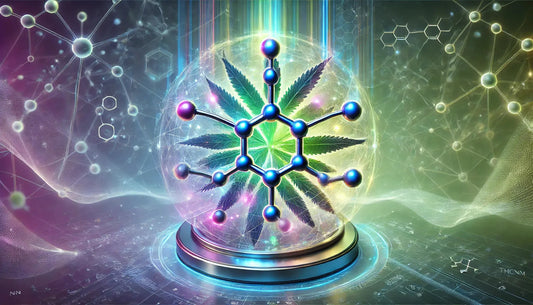There are many different cannabinoids that can provide positive effects such as relaxation and a better mood. Many of these are also known for their stress-relieving and pain-relieving properties. But the question is whether these positive effects are really worth the risk if you have to undergo a drug test. Today's drug analyses are not sophisticated enough to distinguish between different cannabinoids, which means that the use of substances such as THCNM can lead to a positive test result.
Let's take a closer look at why THCNM can give a false result and what you should consider if you need to take a drug test after using this substance.
Is THCNM a drug?
Although THCNM is a synthetically modified derivative of the drug-classified substance THC, there is an important difference to know: THC is classified as a drug while THCNM is completely legal.
Researchers who developed THCNM chose to modify the molecular structure of THC, resulting in a substance with unique properties and potential health benefits. Although it is derived from THC, this modified structure has led to THCNM not being classified as a narcotic.
According to the Swedish Public Health Agency, THCNM is not on the list of products that are hazardous to health, which means that it is legal to buy products that contain this cannabinoid. Therefore, THCNM is not a drug in the legal sense. However, one should be aware that the use of THCNM can give results in drug tests that are sensitive to cannabinoids.
Is THCNM classified as a drug?
When new substances are introduced onto the Swedish market, the Public Health Agency reviews them to assess whether they are harmful to human health or society. If a substance is deemed to be hazardous to health or socially harmful, it can be banned and classified as a narcotic to prevent it from being sold or purchased. If the Public Health Agency believes that a substance should be banned, a proposal is sent to the government, which makes the final decision.
Since THCNM is a relatively new cannabinoid, it is unlikely that it has been reviewed by the Public Health Agency yet. If it were to be reviewed in the future, it is uncertain whether it will be classified as a drug or not. Currently, THCNM is a legal cannabinoid that can be sold and purchased freely. However, there may be a risk that it will give results in drug tests that are sensitive to cannabinoids.
Can THCNM cause side effects in drug tests?
Standardized drug tests are designed to detect specific substances and their metabolites in the body. If you have smoked marijuana or used other drugs, it will usually show up on the test. There are several situations in which you may be required to take a drug test, such as:
- In case of suspicion of a crime, such as drug offenses or drunk driving
- In case of suspected drug influence
- In workplaces with a drug policy and suspicion of intake
- Upon new employment
- In case of substance abuse problems
Drug tests can be done using both blood and urine samples to determine if you have used drugs. If you are required to take a drug test and have used THCNM, it is important to be aware that it may give a positive result. The reason for this is that THCNM is a cannabinoid and many drug tests are sensitive to substances that are similar to THC, the main psychoactive component in cannabis. Because THCNM has a similar structure, it can give a false positive result on a drug test.
Can THCNM be detected in urine samples?
Urine testing is the most common method of drug testing because it is easier to detect drugs in urine than in blood. Drugs are more concentrated in urine, which means they can be detected for a longer period of time after ingestion. In the case of THC and its derivatives, including THCNM, it is possible to test positive for THCNM in a urine sample.
This is because cannabis drug tests often look for the THC metabolite THC-COOH. While THCNM and THC are not exactly the same substance, they are structurally similar enough that THCNM can detect THC-COOH, which can lead to a false positive for cannabis. Since urine tests often test for both natural and synthetic cannabinoids, it is especially likely that THCNM will be detected.
Additionally, the body can metabolize THCNM into compounds similar to the metabolites of THC that the test is looking for, which also increases the risk of a positive result.
Is THCNM visible in blood samples during drug tests?
Blood tests are also used to test for drugs, and can provide detailed information about what substance was ingested, the amount of the substance in the blood, and whether the active substance is present. Because blood tests measure THC directly, rather than THC metabolites such as THC-COOH, THCNM is less likely to give a positive result on a blood test than a urine test. If you know you have used THCNM and need to undergo a drug test, it may be a better idea to request a blood test, as it is less sensitive to synthetic cannabinoids such as THCNM.
The difference between THCNM and THCH in drug tests
Both THCNM and THCH are cannabinoids that can show up in drug tests, but they differ in their chemical structure and effects.
THCNM and drug testing: THCNM is a modified version of the narcotic cannabinoid THC, which means it can give a positive result on drug tests. This is because drug tests often look for the metabolite THC-COOH, which is produced when THC breaks down in the body. Because THCNM and THC are chemically similar, THCNM can be metabolized to compounds that resemble THC metabolites, which can lead to a false positive result in urine tests. Because urine tests are more likely to detect metabolites than blood tests, the risk of a positive result is greater with urine tests.
THCH and drug tests: THCH is another psychoactive cannabinoid, which is considered much more potent than THC – up to 25 times stronger. THCH was previously legal in Sweden, but in December 2024 the Public Health Agency recommended that it be classified as a narcotic. As with THCNM, THCH can also give a positive result in drug tests, as it breaks down to THC-COOH or similar metabolites, which many drug tests are designed to detect.
Why THCNM may show up on drug tests: Although THCNM is a semi-synthetic cannabinoid and not exactly identical to THC, it can test positive on a drug test due to its similarity to THC. Drug tests are not always sophisticated enough to distinguish between these substances, which can cause THCNM to show up on the test, especially in urine tests.
How long does THCNM show up in a drug test? How long THCNM can be detected in a drug test depends on several factors:
-
Metabolism: An individual's metabolism affects how quickly the body breaks down and eliminates THCNM. Some people have faster metabolisms and excrete substances faster than others.
-
Dosage and Frequency: Higher doses and regular use will increase the time it takes for the body to metabolize and eliminate THCNM. If you have used large amounts or used it regularly, it may take longer for the substance to completely leave your body, which will increase the detection time in drug tests.
In conclusion, THCNM can show up in drug tests, especially in urine samples, because it is metabolized into compounds similar to those created by THC. How long it can be detected depends on individual factors such as metabolism and dosage.
Extended detection time for THCNM in drug tests
Another factor that extends the detection time of THCNM in drug tests is that the substance is fat-soluble. This means that it can be stored in the body's fatty tissue and therefore remain in the body for longer. Fat-soluble substances like THCNM tend to have a longer residual time in the system, as they are slowly released from fat stores.
Generally, THCNM can be detected in urine samples for up to 30 days after use. However, for blood samples, the detection time is shorter, usually between 12 and 24 hours.
How to avoid a positive THCNM drug test
To avoid a positive result on a THCNM drug test, you should stop using products containing this substance well in advance of the test. If you are going to provide a blood sample, it is recommended to abstain from THCNM for at least 24 hours before the test. However, if you are going to provide a urine sample, you should avoid the substance for at least a month to reduce the risk of a positive result.
Drug tests and their sensitivity to cannabinoids
There are clear differences between urine and blood drug tests. A urine test detects the metabolite THC-COOH, while a blood test identifies THC directly. Because THCNM is similar in structure to THC and is metabolized to compounds similar to THC-COOH, THCNM is more likely to show up in a urine test than in a blood test.
It is also important to remember that drug tests are not sophisticated enough to distinguish between different cannabinoids. This means that there is a higher risk of THCNM being confused with THC, which can lead to a false positive result. It is important to be aware that THCNM can show up for a longer period of time after the substance has been ingested, especially in urine samples, where it can be detected for up to 30 days, depending on factors such as metabolism, dose and frequency of use.



